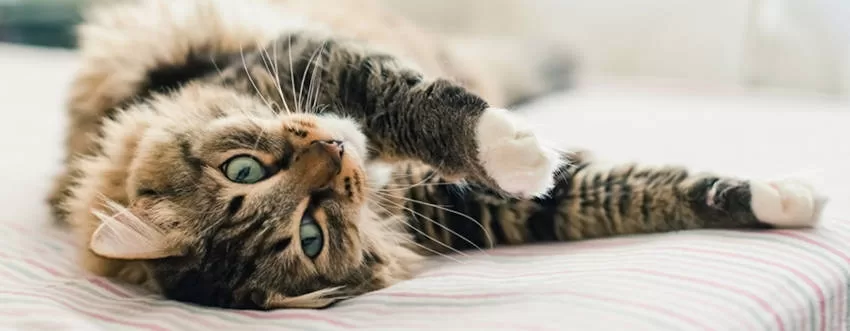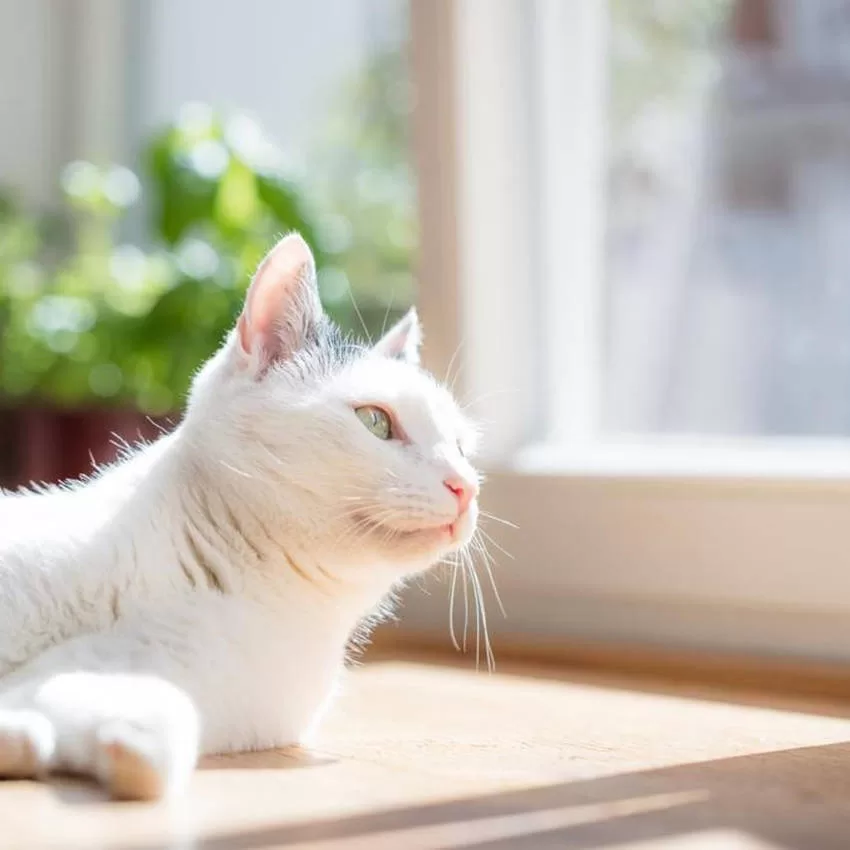Cats are fascinating animals and full of behavioral curiosities. An interesting aspect about them is their nocturnal behavior. While we humans prefer to rest during the night, cats are known to be more active and exploratory during this period.
But why are cats nocturnal animals? There are several theories that try to explain this peculiar characteristic. Some experts believe that cats are descended from wild animals that were active at night, which may have influenced their current behavior.
During the night, cats tend to engage in typical behaviors such as hunting prey, exploring the environment and playing. Their well-developed night vision allows them to move with ease even in low-light conditions. In addition, cats have keen hearing and a sensitive sense of smell, which helps them detect movement and smells in the dark.
There are some factors that influence the nocturnal behavior of cats. One of them is the hunting instinct, which is natural for these animals. During the night, they have the opportunity to chase prey and show their predatory behavior. In addition, the silence and tranquility of the environment at night can encourage cats to feel more comfortable exploring and playing.
To deal with the nocturnal behavior of cats, it is important to provide adequate stimuli during the day so that they can expend energy. Interactive toys, scratching posts and play sessions are great ways to keep cats entertained and tired before bed. Also, it’s important to establish a consistent feeding and sleeping routine so that cats can adapt to the family’s schedules.
There are many myths and truths about the nocturnal behavior of cats. For example, it’s a myth that cats are more aggressive at night. In fact, they might just be showing their predatory instinct and playing around. It is also a myth that cats never sleep at night. Just like humans, they need adequate rest and sleep.
Fun facts about cats’ nocturnal behavior include the fact that they have an uncanny ability to hide and move silently in the dark. They also have a unique “nightwalk” behavior, where they explore the environment without a specific goal.
In conclusion, understanding and accepting the nocturnal behavior of cats is essential to provide them with a suitable and rewarding environment. Whether hunting or playing, cats are more active at night. Providing adequate stimuli and establishing a consistent routine are effective ways to deal with this behavior. Cats are fascinating creatures, and their nocturnal nature is just one of the many oddities that make them so special.

Why are cats nocturnal animals?
Cats are known to be nocturnal animals, which means they are more active during the night than during the day. This can be noticed by cat owners, who are often awakened by their felines’ meowing or playing during the night.
But why are cats nocturnal animals? There are some theories that try to explain this characteristic behavior. One is that cats are descended from wild cats, which are nocturnal hunters. Thus, domestic cats would have inherited this preference for the nocturnal period to hunt and explore the environment.
In addition, cats have a well-developed night vision, which helps them see in the dark. Their pupils dilate and their retinas have cells that are sensitive to low light, allowing them to see better at night. This can be an advantage when searching for prey, as many rodents are also nocturnal animals.
Another theory is that cats are more active at night to avoid the intense heat of the day. Unlike humans, cats have a high body temperature, which can be uncomfortable in very hot climates. Thus, they prefer to remain calm and rested during the day, when the temperature is higher, and become more active during the night, when the weather is milder.
It is important to point out that not all cats are strictly nocturnal. Some cats can adapt to their owners’ routine and have peaks of activity at other times of the day. However, it is common for most cats to show more active behaviors at night.
In summary, cats are nocturnal animals due to their heritage as nocturnal hunters, their keen night vision, and their quest to avoid the heat of the day. Understanding and respecting this natural behavior of cats is essential to provide a suitable and enriching environment for them.

Typical cat behaviors at night
Cats are nocturnal animals by nature and exhibit specific behaviors at night. These behaviors can vary from cat to cat, but there are some common characteristics that are observed in most of these felines during the nocturnal hours.
1. Intense activity: During the night, cats tend to be more active and energetic. They like to explore the environment, run, jump and play. It is common to observe cats chasing objects or hunting insects during this time of day.
2. Vocalization: Cats can become more vocal at night. They may meow louder and more frequently, especially if they are seeking attention or communicating with other cats in the neighborhood.
3. Hunter behavior: Cats are natural predators and at night they can express this behavior even more. They can stay alert for any movement or sound, prepared to hunt potential prey.
4. Nocturnal Exploration: Cats are known for their curiosity and this also applies to the night hours. They take advantage of the darkness to explore indoor and outdoor environments, investigating corners, furniture and objects.
5. Hygiene: During the night, cats also tend to dedicate themselves to their personal hygiene. They spend hours licking themselves, grooming and keeping themselves clean.
6. Interspersed sleep: Even though they are nocturnal animals, cats also take naps throughout the night. They may sleep for short periods of time and then return to activity.
7. Territorial marking: During the night, cats can mark their territory by scratching furniture, walls or objects. This is a way of communicating with other cats and a way of demarcating space.
It is important to understand and respect these behaviors, providing suitable environments for cats to express their nature and satisfy their needs.

Factors that influence the nocturnal behavior of cats
Cats are nocturnal animals by nature, but some factors can further influence their behavior at night. Understanding these factors is essential for properly dealing with cats’ nocturnal behavior.
1. Hunting instinct: Cats are predators by nature and have a highly developed hunting instinct. During the night, when most of their prey is active, cats tend to become more active and alert. They can spend hours chasing insects, mice or toys that resemble prey. It’s important to provide interactive toys and play sessions before bedtime to help satisfy this instinct.
2. Night vision: Cats’ eyes are adapted for night vision. They have a greater amount of photoreceptor cells called rods, which are responsible for vision in low light conditions. This allows them to see better at night and move around easily.
3. Safe environment: Night is a quieter and more peaceful time, which can make cats feel safer to explore and move around. During the day, movement and noise can be stressful for some cats, making the night a more conducive time for activity and play.
4. Sleeping habits: Cats are animals that easily adapt to different sleep patterns. They are capable of sleeping up to 16 hours a day, but those hours of sleep are often broken up into short naps throughout the day. During the night, when humans are usually asleep, cats can move around and explore.
5. Human influence: Human interaction with cats can also influence their nocturnal behavior. If cats are used to receiving attention and play during the night, they may associate this time with activity and stimulation, naturally becoming more active during this period.
In summary, cats are nocturnal animals due to their hunting instinct, their dark-adapted vision, their sense of security at night, their flexible sleeping habits and human influence. It is important to understand these factors and adjust the environment and interactions to ensure cats have a healthy and balanced routine.
How to deal with nocturnal cat behavior
Cats are nocturnal animals by nature and their nocturnal behaviors can often be a challenge for owners. However, there are ways to deal with this behavior and ensure a harmonious coexistence with your feline. Here are some useful tips:
1. Establish a consistent routine
Cats are creatures of habit and benefit from a consistent routine. Try to establish regular times for feeding, playing and sleeping. This will help regulate your cat’s internal clock and decrease its nocturnal activity.
2. Provide physical and mental activities during the day
A cat that expends a lot of energy during the day will be more likely to sleep at night. Make sure your cat has toys and scratching posts available to stimulate its body and mind. Interactive games and simulated hunting sessions are also great options for tiring your cat out.
3. Avoid reinforcing unwanted behaviors
If your cat is waking you up during the night to play or beg for food, avoid giving in to his requests. By doing this, you will be reinforcing this behavior and encouraging it to continue. Try to ignore unwanted behaviors and reward your cat when he is calm and peaceful.
4. Create a suitable sleep environment
Make sure your cat has a comfortable sleeping space for the night. A soft bed, warm blankets and a peaceful atmosphere can help your cat feel more relaxed and more likely to rest during the night.
5. Consider using calming pheromones
There are products on the market that contain synthetic pheromones that can help calm cats and reduce anxiety. Considering using these products may be an option to help lessen your cat’s nocturnal behavior.
Dealing with nocturnal cat behavior can take patience and persistence, but it is possible to find a balance between your feline’s needs and your own. Remember that each cat is unique and may require different approaches. Observe your cat’s behavior, experiment with different techniques and seek veterinary advice if necessary. Over time, you will be able to find a way to harmoniously coexist with your feline’s nocturnal behavior.

Myths and truths about the nocturnal behavior of cats
Cats are fascinating animals and often surrounded by mysteries. Its nocturnal behavior is one of the most intriguing features and often surrounded by myths and truths. Let’s explore some of them:
Myth: Cats are nocturnal animals by nature.
Truth: Although cats are most active at night, they are also able to adapt to daytime schedules. Their nocturnal behavior is a result of their evolutionary history as nocturnal hunters, but they can adjust to their owner’s lifestyle.
Myth: Cats are lazy during the day because they are awake at night.
Truth: Cats have what is called a polyphasic sleep-wake cycle. This means they sleep in short bursts throughout the day, even when they are awake. So even if they are active at night, they still need a lot of naps during the day.
Myth: Cats are night owls and stay up all night.
Truth: Although cats are most active at night, they also have moments of rest and sleep during this period. They may spend part of the night hunting or playing, but they also need quiet and relaxation time.
Myth: Cats are more aggressive at night.
Truth: The aggressive behavior of cats is not directly related to the time of day. Cats can display aggression at any time, depending on circumstances and individual factors. It is important to understand and watch for signs of aggression in cats to avoid problems.
Myth: Cats need to be kept indoors overnight.
Truth: While it’s recommended to keep cats indoors at night to ensure their safety, some cats may benefit from access to the outdoors at night. This may depend on the environment they live in and their ability to protect themselves from external dangers.
By understanding the myths and truths about cats’ nocturnal behavior, we can have a clearer view of their needs and behaviors. Each cat is unique and it is important to observe and respect their individual preferences. Allowing them to express their nocturnal behavior in a healthy and safe way is essential to their overall well-being.

Curiosities about the nocturnal behavior of cats
Cats are fascinating animals and full of curious behaviors. Their nocturnal behavior is one of the most interesting features of these cats, and here are some fun facts about this aspect:
- Night Vision: Cats have highly developed night vision. Your eyes contain special cells called rods, which allow them to see in low light. In addition, they have a reflective layer called the tapetum lucidum, which amplifies available light, giving them exceptional night vision.
- Night Walks: Cats usually have a habit of going out for walks at night. This is a manifestation of their hunting instinct, as many prey are more active at night. Also, the cooler temperature and lesser presence of other animals make them more likely to explore and have fun.
- Vocal communication: During the night, cats tend to be more vocal, especially when they are seeking attention or wanting to attract other cats. Their nocturnal meows can vary according to the situation, ranging from mating calls to requests for companionship.
- Night Play: Cats are known for their playful nature, and this behavior is no different at night. Many cats have bursts of energy at night and may run, jump and chase toys or shadows. It is important to provide suitable toys for these nighttime activities, ensuring that they can safely release their energy.
- Nocturnal Hunting: The hunting nature of cats is most evident at night. Even if they are domestic animals, they still carry the hunting instinct. During the night, cats can chase insects, mice or even toys, simulating a hunting behavior that is essential for their physical and mental health.
These are just a few curiosities about the nocturnal behavior of cats. It is important to understand and respect these cats’ natural instincts to ensure their well-being and provide an enriching environment for them.

Curious Behaviors of Cats
Cats are fascinating animals and full of curious behaviors. Whether during the day or at night, these domestic cats can surprise us with their peculiar attitudes. By understanding and accepting the nocturnal behavior of cats, we can enjoy living with these very special pets even more.
One of the curious behaviors of cats at night is their hyperactivity. While many animals rest at night, cats seem to come to life, running, jumping and exploring their environment with extreme agility. This extra energy can be attributed to the fact that cats are nocturnal animals by nature, which means they have a natural tendency to be more active during the night.
In addition, cats have excellent night vision, which allows them to hunt and move easily even in dark environments. This ability is the result of a combination of factors, such as an increased amount of photosensitive cells in your eyes and a specialized structure in your retina that amplifies available light.
Another curious behavior of cats at night is their propensity to vocalize. Cats are known to make a variety of sounds, from soft meows to growls and even squeals. During the night, these sounds can become more frequent, as cats use vocalization as a way of communicating and expressing their needs and emotions.
There are also other curious behaviors that cats can exhibit at night, such as marking their territory with urine, which can be a way of demarcating space and establishing their presence. In addition, cats can present hunting behaviors, such as chasing shadows, toys or even insects that are present in the environment.
It is important to emphasize that each cat is unique and may have different nocturnal behaviors. Some may be more active and noisy, while others may be more laid-back. The understanding and acceptance of these behaviors are essential for a harmonious coexistence with cats.
Overall, cats’ curious behaviors at night are a manifestation of their natural instinct and species-specific characteristics. By observing and understanding these behaviors, we can provide a suitable and enriching environment for our feline friends, ensuring their well-being and satisfaction.
External Links:

